A Research Agenda for the Gig-Economy and Society
 Title of video: Workers’ Rights in the Digital Age [View Video]
Title of video: Workers’ Rights in the Digital Age [View Video]
A Research Agenda for the Gig-Economy and Society Read More »
 Title of video: Workers’ Rights in the Digital Age [View Video]
Title of video: Workers’ Rights in the Digital Age [View Video]
A Research Agenda for the Gig-Economy and Society Read More »
 Authors: Cremers J. and Houwerzijl M.
Authors: Cremers J. and Houwerzijl M.
Date of Publication: 2021
This report fits in an ETUC-project on ‘Securing Workers Rights in subcontracting chains’ as a second
stage of research and analysis. The objective of the project is to build a case for a consistent EU
approach towards subcontracting and to help create better tools and conditions (a more adequate
legal framework) for workers’ representatives to know about their rights and to be informed and
consulted about the practices of their company along its subcontracting chain. [View resource]
Subcontracting and social liability – Report & policy recommendations Read More »
Date of Publication: 2021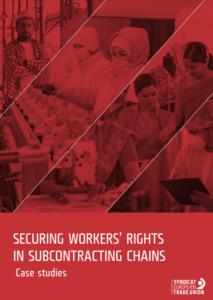
The investigation and assessment of European subcontracting chains carried out in six sectors for
ETUC. [View resource]
Report: Subcontracting out: Case-studies in different-sectors Read More »
 Authors: Imraan Mahomed, Kelebogile Selema
Authors: Imraan Mahomed, Kelebogile Selema
Date of Publication: 2021
When the world of work, like every other facet of our lives, has to be reimagined because of a
relentless pandemic that continues to ravage our everyday lives, the words “show you the world,
shining, shimmering, splendid” do not ring true. [View resource]
The World of work re-imagined Read More »
Date of Publication: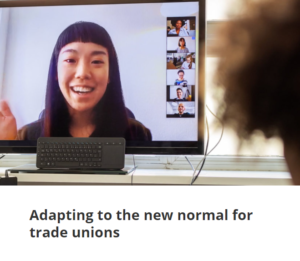 2021
2021
Working with union leaders from across the New Digital Lab movement, they have mapped out 27
common challenges faced by unions after a year of adapting to Covid-19. Some of these challenges
have been caused by the response to the pandemic. Some are wider issues that the pandemic has
exacerbated. But all of them are likely to stay with us for the long term. [View resource]
Adapting to the “new normal” for unions – New Digital Lab report Read More »
Author: Trebor Scholz, Dough O’Brien and Jason Spicer.
Dough O’Brien and Jason Spicer.
Date of Publication: 11 March 2021
Can Cooperatives Build Worker Power? Give platform co-ops a seat at the policytable Read More »
Date of Publication: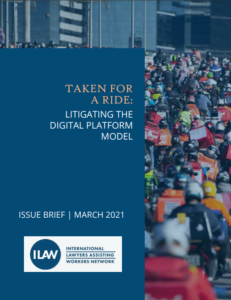 2021
2021
The ILAW Network is pleased to present the first in its series of special publications. This report,
Taken for a Ride: Litigating the Digital Platform Model, attempts to respond to requests from ILAW
Network members and others for comparative analysis on the litigation taking place around the
world against digital platforms such as Uber, Foodora, Deliveroo and many others. This report is
divided into two parts. Part I is an essay prepared by Jason Moyer-Lee1 and Nicola Contouris2 which
surveys the major cases which have been brought by workers against digital platforms concerning
the existence of an employment relation-ship – whether to contest unjust dismissal, to claim a
certain wage or benefit or to be able to join a union and benefit from a collective agreement. Part II
of this report is a digest of key judicial decisions concerning digital platforms, including case
summaries from every region and related news and analysis. [View resource]
Taken for a ride: Litigating the digital platform model Read More »
Author: Kirsten Eiser, Siya Ngcamu, Shane Johnson and Keah Challenor.
Ngcamu, Shane Johnson and Keah Challenor.
Date of Publication: 2 March 2021
Uber drivers are currently classified as independent contractors in South Africa, but there are plans
to launch a class action to compel Uber SA to confer several key rights on its drivers, which, if
successful, will affect the rights of platform workers. The outcome of the potential class action will
significantly influence not only the rights of Uber drivers, but also the rights of other individuals
undertaking platform work. This is an area which the authors hope to continue to monitor and to
provide updates as soon as new developments arise. [View resource]
UBER drivers in South Africa : Employees or independent contractors? Read More »
Date of Publication: 25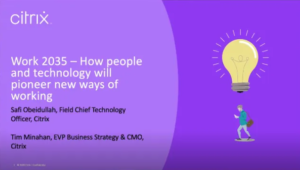 May 2021
May 2021
Nowhere is our future more in flux than the future of work. The COVID-19 pandemic has forced
many organisations to revolutionise their ways of working almost overnight and brought the future
of work to the present. Remote work has become the “new normal,” and companies are making it
part of their long-term strategies to ensure business continuity. Work will never be the same again.
Yet it remains central to what it means to be human. Work gives us meaning and for centuries
labour, driven by both humans and technology, has enabled remarkable advances in human life
expectancy, prosperity and achievement. How will this relationship between the workforce, work
models and work environment evolve? And how can we as business leaders, policymakers and
individuals see further into the forces that will shape our future and bring about the future we want?
We asked some of the world’s most respected academics, business leaders and employees across
the US and Europe to join us in imagining what the future of work might look like in 2035, the
opportunities and threats it might hold, and how people and technology may work together to
generate value. This exercise raised the fundamental questions that must be faced by every business
and government organisation in their long-term strategic planning. How will workers be organised to
deliver value? How will people partner with technology and will we see the emergence of human-
machine teaming? What new opportunities will workers be afforded and what novel pitfalls will they
face? How might governments and supranational entities respond with regulation to support
workers and ensure competition in the new world of work? [View resource]
Work 2035 – How people and technology will pioneer new ways of working Read More »
Date of Publication: 16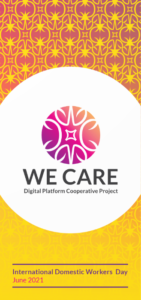 June 2021
June 2021
This is a brief pamphlet to celebrate International Domestic Workers Day. [View resource]
International Domestic Workers Day, 16 June 2021 Read More »